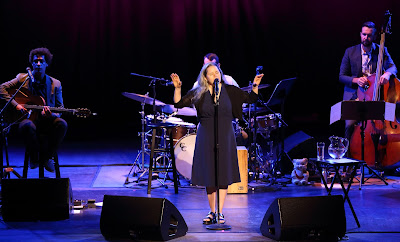- Details
-
Parent Category: Film and the Arts
-
Category: Reviews
-
Published on Tuesday, 11 July 2017 02:55
-
Written by Kevin Filipski
Children of a Lesser God
Written by Mark Medoff; directed by Kenny Leon
Performances through July 22, 2017
John Mellencamp
July 1, 2017
Natalie Merchant
July 2, 2017
There’s so much to choose from while in the Berkshires—music, museums, theater, ballet, historic sites, shopping, restaurants—that it’s impossible to do more than a few things on a weekend trip. This time around it was Children of a Lesser God in Stockbridge, and John Mellencamp and Natalie Merchant concerts at Tanglewood.
 |
| Joshua Jackson and Lauren Ridloff in Children of a Lesser God (photo: Matthew Murphy) |
Most people remember Children of a Lesser God from the 1986 movie version, which won an Oscar for Marlee Matlin in her sensational debut as a feisty deaf woman who falls in love with the hearing teacher wanting her to read lips and speak, while she stubbornly remains in her sign-language world. Despite its creaky dramaturgy, Mark Medoff’s earnest drama nevertheless works strongly in Kenny Leon’s thoughtful staging on the Berkshire Theatre Group’s stage.
Medoff tackles the themes of miscommunication and the physicality of love between people from (literally) two different worlds: James Leeds and Sarah Norman are shown sympathetically but realistically, rough edges and all. As embodied by Joshua Jackson (whose James is full of vigor and charm) and newcomer Lauren Ridloff (who has an appealing stage presence and dramatic heft as Sarah), our protagonists are a worthy adversarial couple.
Director Leon navigates this relationship sensitively, even if he is occasionally tripped up by Medoff’s central conceit: James repeating whatever Sarah and the other deaf characters sign becomes wearying after two-plus hours. (I don’t remember it being that annoying in the movie.) Still, with two excellent actors at the center—a revelatory Jackson in a demanding role, and a sensational find in Ridloff—Children of a Lesser God is emotionally satisfying theater.
* * *
The Tanglewood experience is one of the summer’s finest. Sitting on the lawn for a concert under the stars can’t be beat—especially when you can bring anything onto the grounds for a picnic, which people do: tents and tables, lawn chairs and coolers, hors d’oeuvres and main dishes, wine and beer, fruits and desserts. Add to all of that the most casual vibe of any outdoor amphitheater.
Tanglewood concerts by John Mellencamp and Natalie Merchant were prime examples of still-relevant music of artists unworried that their most popular days are behind them. (But don’t tell that to the thousands who showed up both nights.)
 |
| John Mellencamp at Tanglewood (photo: Hilary Scott) |
John Mellencamp—who has remarkably morphed from an arrogant young cock-rocker named Johnny Cougar into one of our most perceptive and sympathetic chroniclers of ordinary American lives—played a lean, dynamic 90-minute set that included several of his biggest hits along with more politically charged recent material, like the stand-out trio of songs from his latest album, Sad Clowns & Hillbillies, which he recorded with Carlene Carter, who opened the show.
The lovely harmonizies of Carter and Emmylou Harris—whose fine 45-minute set followed Carter’s—joined Mellencamp for the stately “My Soul’s Got Wings,” and Mellencamp sang a powerfully raspy “Easy Target,” the most trenchant of his current political songs. He even broke out a rousing “Pop Singer,” his 1989 hit about how much he hates being a hit-making jukebox. So it was no surprise that, when it came to “Jack and Diane,” Mellencamp basically told the audience he hates singing it but knows everyone wants to hear it—so he did a solo acoustic version, letting the enthusiastic crowd take over for the “Oh yeah, life goes on” chorus.
But he’s not averse to all of his hits—he and his crack band (including his MVP violinist Miriam Sturm) cranked out hard-hitting renditions of “Pink Houses,” “The Authority Song,” “Paper in Fire” and, for his lone encore, “Cherry Bomb,” which immaculately closed the show.
 |
| Natalie Merchant at Tanglewood (photo: Hilary Scott) |
Natalie Merchant’s enduring solo career began nearly a quarter-century ago, after she left 10,000 Maniacs, and her latest tour—subtitled “3 Decades of Song”—features many songs of more recent vintage, wildly appreciated by the Tanglewood.
Of course, she did play tunes from her multi-million-selling solo debut, 1995’s Tigerlily: “Carnival,” “Wonder,” “River” and an unbearably emotional rendition of “Beloved Wife,” which was nearly ruined by some in the audience who felt the need to shout out during the song’s many quiet moments. But Merchant and her band—which featured a superb string section that provided lush but not overbearing accompaniment to these singular story-songs—showed their musical mettle right from the starkly beautiful opener “Lulu” from her eponymous 2014 album.
As for political commentary, Merchant waited until her second set—sans intermission, the show spanned 25 songs and a generous 2 hours and 45 minutes—when she introduced the biting “Saint Judas” with the quip that it’s “for all the racists and bigots in Washington D.C.”
For someone who writes and sings many minor-key, downbeat songs, Merchant has always been a buoyant performer: yes, her delightfully daffy dancing, spinning, hand gestures and arm-flailing are still very much in evidence. (By the encores, she had literally kicked off her shoes to run barefoot from one side of the stage to the other.) And she pointedly saved her most joyous songs for the end: a jubilant “These Are Days” gave way to the ecstatic singalong “Kind and Generous,” the perfect summation of another perfect Tanglewood evening.
Children of a Lesser God
Berkshire Theatre Group, Stockbridge, Massachusetts
berkshiretheatregroup.org
John Mellencamp
Natalie Merchant
Tanglewood, Lenox, Massachusetts
bso.org

















